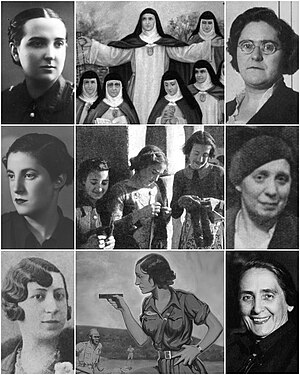
Back النسويات والحرب الأهلية الإسبانية Arabic নারীবাদী ও স্পেনীয় গৃহযুদ্ধ Bengali/Bangla Feminismo y guerra civil española Spanish فیمینېستان او د هسپانیا کورنۍ جګړه Pashto/Pushto எசுப்பானிய உள்நாட்டுப் போரில் பெண்ணியவாதிகள் Tamil
| Part of a series on |
| Women in the Spanish Civil War |
|---|
 |
|
|
Feminists were involved in the Spanish Civil War, although the conditions underlying their involvement pre-dated the Second Republic.
The feminist movement in Spain started during the 19th century, aiming to secure rights for women and striving for more than women could expect from their place in the home. Supported by a number of Spanish writers, it was one of the first feminist movements to inject anarchism into feminist thinking. In contrast to feminism developments elsewhere, many Spanish feminists sought to realize their goals in this period through the education of women. When political activity took place to further feminist goals and the more general aspirations of groups, it tended to be spontaneous and easily dismissed by men. Margarita Nelken, María Martínez Sierra and Carmen de Burgos were all important pre-Republic writers who influenced feminist thinking inside Spain.
The dictatorship of Primo de Rivera provided more opportunities for women to be engaged politically, with the appointment of women to the Congreso de los Diputados. Thought they were not successful, the first steps were also taken towards women's suffrage. Feminine independence, principally organized in Madrid around the Lyceum Club, was condemned by members of the Catholic Church and viewed as scandalous. Women continued to be locked out of political and labor organizations such as the Spanish Socialist Workers' Party and the Confederación Nacional del Trabajo.
Feminism in the Republican and Civil War eras was typically about "dual militancy" and was greatly influenced by anarchism and by an understanding of potential societal developments. Yet increased women's emancipation was constantly threatened by leftist attempts to prevent their opponents from taking power. Most of the advances gained, including the right to vote, civil marriage, abortion and access to birth control would be lost before the Second Republic fell. Clara Campoamor Rodríguez was the most important proponent of women's suffrage in this period.
During the Civil War, mainstream leftist feminism often took on an individualistic approach to addressing inequalities, with battles as to whether their autonomy should be personal or political. Mujeres Libres, founded by Lucia Sánchez Saornil, Mercedes Comaposada and Amparo Poch y Gascón in May 1936, became one of the most important organizations for feminists. Dolores Ibárruri earned herself the nickname La Pasionaria as she traveled the country to speak in opposition to Francoist forces, making her one of the most visible and important feminist voices.
Francisco Franco and his forces won the Civil War in 1939. Mainstream feminism subsequently disappeared from public discourse, largely being replaced publicly by an oppressive form of state-sponsored feminism that was no more than support for Spain's traditional gender roles that denied women personal and political autonomy. Traditional gender norms returned with force. Sanctioned feminist writing in the post-war period stemmed largely from the works of aristocratic women such as María Lafitte, Countess of Campo Alanaga, and Lilí Álvarez. Works by Republican pre-war feminists like Rosa Chacel and María Zambrano, who continued to write in exile, saw their works smuggled into Spain. As a result, the contributions women and feminists had made during the Civil War were largely forgotten.
© MMXXIII Rich X Search. We shall prevail. All rights reserved. Rich X Search